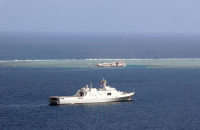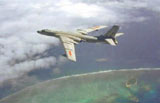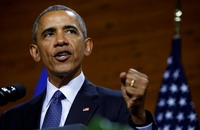The decline in the number – and the rising cost – of domestic maids has forced more young, working parents to send their children to daycare centres.
Chris Hong, who runs two kindergartens-cum-daycare centres in Subang Jaya, said she and her staff looked after 40 to 50 children from 8am to 7pm daily.
The centres, which only cater for two-month-old babies to children aged six, provide lunch, homework coaching and other activities in the afternoon after the kindergarten session.
“There are even parents-to-be who register at the centre even when they are in the early stages of pregnancy.
“There is very high demand now and parents are looking for safe and trustable daycare centres,” said Hong, adding that she did not plan to set up more daycare centres as she wanted sufficient quality time with her three children.
A daycare centre operator on Penang island, who wanted to be known only as Sarah, said she and her partner were planning to set up two more centres on the mainland.
She added that she had received many enquiries for her services in Butterworth.
“We’re now working out the extra costs we have to bear for hiring more people and rental,” she said.
Technical services manager M. Manimaran felt that increasing the number of daycare centres was an effective alternative for the shortage of maids.
“After all, parents are looking for a safe and good daycare centre which can work around our working hours.
“The place I send my son to even provides transportation from his school to the centre.He gets proper meals and time to do some reading or his homework.
“We have no worries, even during the school holidays,” Manimaran said, adding that he received constant updates about the whereabouts and condition of his 10-year-old son from the daycare centre through WhatsApp.
Working mum Lim Lee, 46, said she would opt to send her child to a daycare centre and hire a part-time maid if her Indonesian maid could not multi-task.
“There is no way I can afford to get two maids,” she said.
Malaysian Maid Employers Association president (Mama) president Engku Ahmad Fauzi Engku Muhsein urged the Government to encourage more nurseries or daycare centres run by properly trained and certified Malaysians.
Such facilities, he said, would not only ease the burden of having to pay for maids but would also give parents peace of mind while they were at work.
Engku Ahmad Fauzi said the expense of using these centres should be tax deductible, adding that it was the Government’s responsibility to solve over-reliance on foreign workers.
These centres, he added, would also provide the local workforce with jobs, ensuring less capital flight from the country.
Ny Royce Tan The Star
PETALING JAYA: Dr Subhashini Jahanath is highly educated, hard-working and does 11 calls a month.
Like many other working mothers, she is now facing the added frustration of sky-high fees for domestic help.
“It’s the childcare that’s difficult – what happens if I get called up in the middle of the night? At the same time, I just cannot afford the fees for a new maid,” she said.
Even then, Dr Subhashini, 35, is one of the lucky ones as she can call on her family for help.
The Miri-based doctor’s father has flown in from Selangor to help take care of her four-year-old son Harraen.
“On days he has to go back to Selangor, I have to send Harraen along with him, which means increased cost and Harraen missing school. But it’s the only way.”
Lawyer V. Shoba, 37, is also blessed with parents who help look after her seven-year-old twins, but still needs a maid to help them.
“My parents are both in their early 70s and need some help with the kids. Having domestic help is not a luxury,” she said.
In 2009, she paid RM6,000 in agency fees and a monthly salary of RM650 for her first Sri Lankan helper.
“In 2011, I got another Sri Lankan maid. The agency fee was RM7,500 and monthly salary was RM850. In 2013, I got a Filipino maid. The agency fee was RM9,900 and the monthly salary was RM1,200,” she said.
The agency fee, she added, has now gone up to RM12,000 and the monthly salary to RM1,500.
“I also have to pay for her toiletries, food and utilities used. That is a chunk of money that could be used for education or even holidays.
For those who are away from their families, babysitters and part-time house help provide alternatives.
Not everyone can call in the grandparent squad, and some parents feel that childcare options out there are not good enough to make them viable alternatives to live-in domestic help.
Corporate communications manager Sonia Gomez, 30, said she could not find any childcare options that were both good and affordable.
“Independent babysitters aren’t regulated, so it would be very tough to cope without my helper, Lia. She is reliable and has a very strong bond with my son,” she said.
Some mothers are opting out of the workforce entirely to take care of their kids.
Stay-at-home mum Evelyn Thong, 37, said she had heard too many daycare horror stories to consider it.
“It’s also too much money to risk. If your maid runs away, you cannot recover your money,” she said.
By Suzanne Lazaroo The Star
PETALING JAYA: The days of having a multi-tasking maid who does everything from cooking and washing to caring for the baby and the elderly and even washing the car is as good as gone.
Malaysians must now be prepared to pay more for specialised help.
Source countries such as Indonesia want to send upskilled helpers for specific jobs like caregiver, babysitter or nanny, and not the traditional domestic maid.
Malaysian Association of Foreign Maid Agencies (Papa) president Jeffrey Foo said all that was needed now was a mechanism to ensure these helpers were properly trained and certified.
Foo said Papa was ready to work with the source countries to create a win-win situation.
“Local employers will be satisfied if they get what they are paying for, which are skilled helpers who can do the task they are hired for,” he said.
The Star reported yesterday that Malaysia is in a fix because neighbouring countries are not in favour of sending domestic help here.
Foo said Indonesia, where most of the foreign maids are from, is not closing the door entirely.
Instead, it is adopting a more professional approach with its policy to stop sending live-in maids from next year.
A possible solution, according to Foo, is for the Government to license companies to supply part-time domestic maids to households who need them.
These companies could take care of the maids’ lodging and food but this would require a shift in government policy.
Foo pointed out that foreign workers brought in as cleaners were not supposed to be sent to work as domestic maids at individual homes.
Malaysian Maid Employers Association president (Mama) president Engku Ahmad Fauzi Engku Muhsein pointed out that the current system of having maids stay under the same roof as their employers for two years was not always ideal.
“If you’re lucky, there’s harmony. Otherwise, you get two years of disharmony,” he said. He echoed the view for local agencies to be allowed a supply of part-time maids.
Engku Ahmad Fauzi said there were currently different expectations between local employers and source countries such as Indonesia. In Indonesia, helpers are hired and trained as caregivers to take care of infants, children and the elderly or as domestic workers who cook, clean and tidy.
M. Sarkuna, a 40-year-old Indonesian maid working here, said those who took care of babies, children and the elderly earned at least RM800 in Jakarta, while those who cooked could take home about RM700.
“The starting pay for those who do household work is only RM500,” she said.
In Malaysia, Engku Ahmad Fauzi said employers often took for granted that maids had to multi-task.
He said the best and most well-trained helpers were not sent here, yet “Malaysian employers want to pay the lowest for the best”.
The way forward, at least in the short term, was to hire maids from cheaper and better source countries besides Indonesia and Philippines, he said.
“But Malaysians need to stop depending on domestic maids in the long run,” he added.
By Neville Spykerman The Star

Chris Hong, who runs two kindergartens-cum-daycare centres in Subang Jaya, said she and her staff looked after 40 to 50 children from 8am to 7pm daily.
The centres, which only cater for two-month-old babies to children aged six, provide lunch, homework coaching and other activities in the afternoon after the kindergarten session.
“There are even parents-to-be who register at the centre even when they are in the early stages of pregnancy.
“There is very high demand now and parents are looking for safe and trustable daycare centres,” said Hong, adding that she did not plan to set up more daycare centres as she wanted sufficient quality time with her three children.
A daycare centre operator on Penang island, who wanted to be known only as Sarah, said she and her partner were planning to set up two more centres on the mainland.
She added that she had received many enquiries for her services in Butterworth.
“We’re now working out the extra costs we have to bear for hiring more people and rental,” she said.
Technical services manager M. Manimaran felt that increasing the number of daycare centres was an effective alternative for the shortage of maids.
“After all, parents are looking for a safe and good daycare centre which can work around our working hours.
“The place I send my son to even provides transportation from his school to the centre.He gets proper meals and time to do some reading or his homework.
“We have no worries, even during the school holidays,” Manimaran said, adding that he received constant updates about the whereabouts and condition of his 10-year-old son from the daycare centre through WhatsApp.
Working mum Lim Lee, 46, said she would opt to send her child to a daycare centre and hire a part-time maid if her Indonesian maid could not multi-task.
“There is no way I can afford to get two maids,” she said.
Malaysian Maid Employers Association president (Mama) president Engku Ahmad Fauzi Engku Muhsein urged the Government to encourage more nurseries or daycare centres run by properly trained and certified Malaysians.
Such facilities, he said, would not only ease the burden of having to pay for maids but would also give parents peace of mind while they were at work.
Engku Ahmad Fauzi said the expense of using these centres should be tax deductible, adding that it was the Government’s responsibility to solve over-reliance on foreign workers.
These centres, he added, would also provide the local workforce with jobs, ensuring less capital flight from the country.
Ny Royce Tan The Star
Working mums ‘maid’ to pay sky-high fees for childcare
PETALING JAYA: Dr Subhashini Jahanath is highly educated, hard-working and does 11 calls a month.
Like many other working mothers, she is now facing the added frustration of sky-high fees for domestic help.
“It’s the childcare that’s difficult – what happens if I get called up in the middle of the night? At the same time, I just cannot afford the fees for a new maid,” she said.
Even then, Dr Subhashini, 35, is one of the lucky ones as she can call on her family for help.
The Miri-based doctor’s father has flown in from Selangor to help take care of her four-year-old son Harraen.
“On days he has to go back to Selangor, I have to send Harraen along with him, which means increased cost and Harraen missing school. But it’s the only way.”
Lawyer V. Shoba, 37, is also blessed with parents who help look after her seven-year-old twins, but still needs a maid to help them.
“My parents are both in their early 70s and need some help with the kids. Having domestic help is not a luxury,” she said.
In 2009, she paid RM6,000 in agency fees and a monthly salary of RM650 for her first Sri Lankan helper.
“In 2011, I got another Sri Lankan maid. The agency fee was RM7,500 and monthly salary was RM850. In 2013, I got a Filipino maid. The agency fee was RM9,900 and the monthly salary was RM1,200,” she said.
The agency fee, she added, has now gone up to RM12,000 and the monthly salary to RM1,500.
“I also have to pay for her toiletries, food and utilities used. That is a chunk of money that could be used for education or even holidays.
For those who are away from their families, babysitters and part-time house help provide alternatives.
Not everyone can call in the grandparent squad, and some parents feel that childcare options out there are not good enough to make them viable alternatives to live-in domestic help.
Corporate communications manager Sonia Gomez, 30, said she could not find any childcare options that were both good and affordable.
“Independent babysitters aren’t regulated, so it would be very tough to cope without my helper, Lia. She is reliable and has a very strong bond with my son,” she said.
Some mothers are opting out of the workforce entirely to take care of their kids.
Stay-at-home mum Evelyn Thong, 37, said she had heard too many daycare horror stories to consider it.
“It’s also too much money to risk. If your maid runs away, you cannot recover your money,” she said.
By Suzanne Lazaroo The Star
Maids for specific tasks only
PETALING JAYA: The days of having a multi-tasking maid who does everything from cooking and washing to caring for the baby and the elderly and even washing the car is as good as gone.
Malaysians must now be prepared to pay more for specialised help.
Source countries such as Indonesia want to send upskilled helpers for specific jobs like caregiver, babysitter or nanny, and not the traditional domestic maid.
Malaysian Association of Foreign Maid Agencies (Papa) president Jeffrey Foo said all that was needed now was a mechanism to ensure these helpers were properly trained and certified.
Foo said Papa was ready to work with the source countries to create a win-win situation.
“Local employers will be satisfied if they get what they are paying for, which are skilled helpers who can do the task they are hired for,” he said.
The Star reported yesterday that Malaysia is in a fix because neighbouring countries are not in favour of sending domestic help here.
Foo said Indonesia, where most of the foreign maids are from, is not closing the door entirely.
Instead, it is adopting a more professional approach with its policy to stop sending live-in maids from next year.
A possible solution, according to Foo, is for the Government to license companies to supply part-time domestic maids to households who need them.
These companies could take care of the maids’ lodging and food but this would require a shift in government policy.
Foo pointed out that foreign workers brought in as cleaners were not supposed to be sent to work as domestic maids at individual homes.
Malaysian Maid Employers Association president (Mama) president Engku Ahmad Fauzi Engku Muhsein pointed out that the current system of having maids stay under the same roof as their employers for two years was not always ideal.
“If you’re lucky, there’s harmony. Otherwise, you get two years of disharmony,” he said. He echoed the view for local agencies to be allowed a supply of part-time maids.
Engku Ahmad Fauzi said there were currently different expectations between local employers and source countries such as Indonesia. In Indonesia, helpers are hired and trained as caregivers to take care of infants, children and the elderly or as domestic workers who cook, clean and tidy.
M. Sarkuna, a 40-year-old Indonesian maid working here, said those who took care of babies, children and the elderly earned at least RM800 in Jakarta, while those who cooked could take home about RM700.
“The starting pay for those who do household work is only RM500,” she said.
In Malaysia, Engku Ahmad Fauzi said employers often took for granted that maids had to multi-task.
He said the best and most well-trained helpers were not sent here, yet “Malaysian employers want to pay the lowest for the best”.
The way forward, at least in the short term, was to hire maids from cheaper and better source countries besides Indonesia and Philippines, he said.
“But Malaysians need to stop depending on domestic maids in the long run,” he added.
By Neville Spykerman The Star










 Illustration: Liu Rui/GT
Illustration: Liu Rui/GT


 A formation of the Nanhai Fleet of China's Navy on Saturday finished a three-day patrol of the Nansha islands in the South China Sea.
A formation of the Nanhai Fleet of China's Navy on Saturday finished a three-day patrol of the Nansha islands in the South China Sea.


